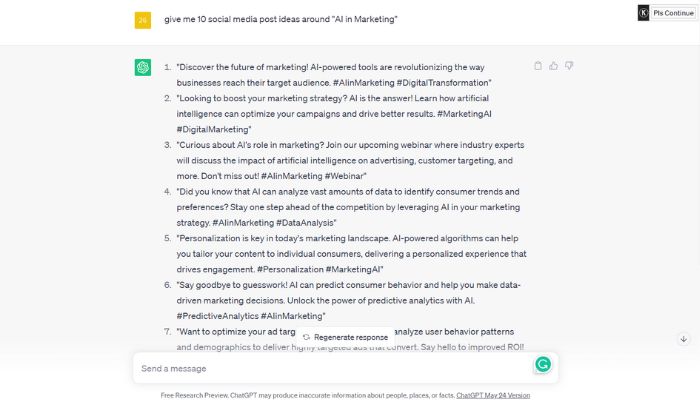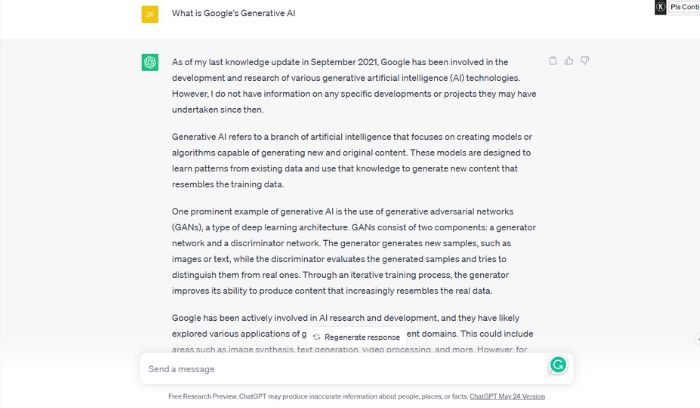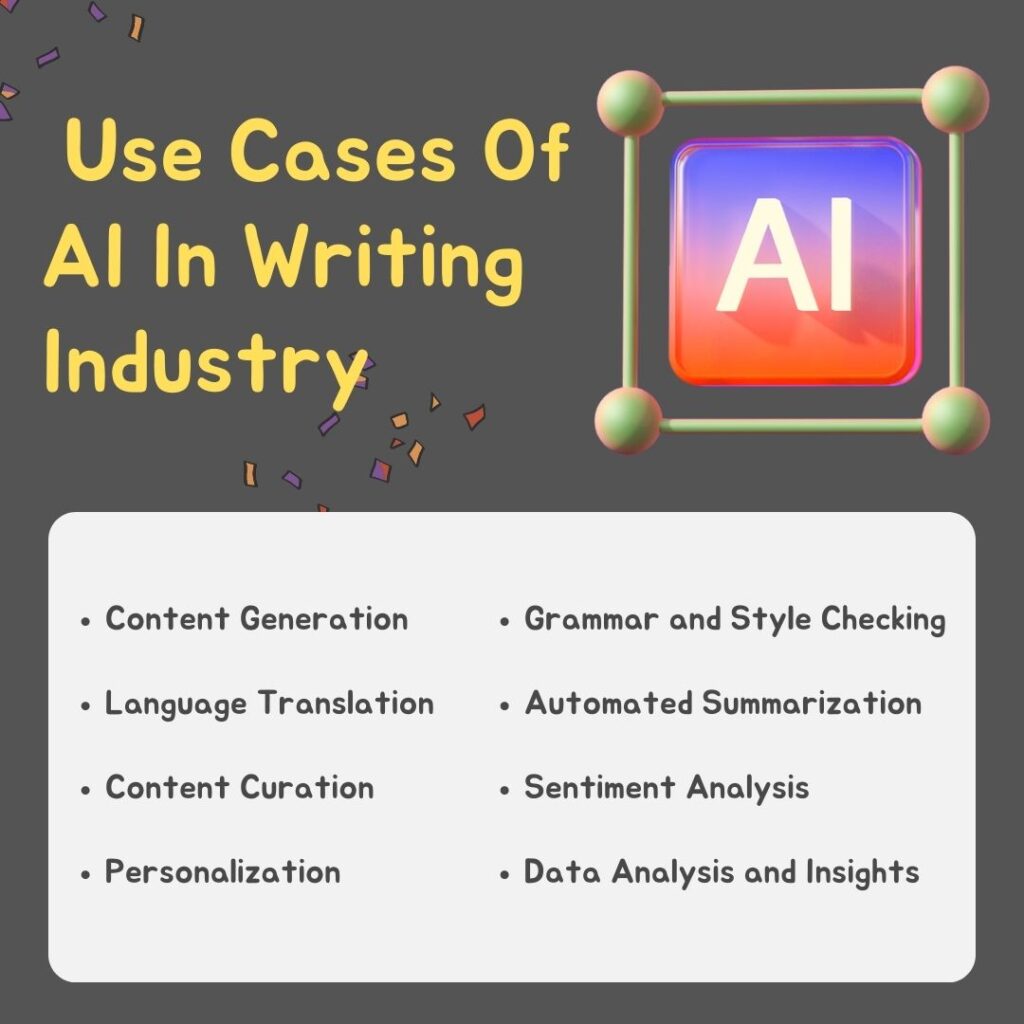If you are searching for “will AI replace writers in 2024 or not?“
Then the clear cut answer is :
It is unlikely that AI will replace writers in 2024. While AI is becoming increasingly sophisticated in its ability to generate text, it still lacks the creativity, empathy, and understanding of human emotions that are essential for great writing.

However,
The writing industry is experiencing a transformative shift with the rapid advancement of Artificial Intelligence (AI).
AI technologies, particularly in the field of Natural Language Processing (NLP), are revolutionizing the way content is generated, edited, and consumed.
This article delves into the power of AI in writing, the pros and cons of AI-powered writing, the current state of AI, the future of AI and human writers, ethical considerations in AI-generated writing, and strategies for writers to embrace the AI writing revolution.
So, let’s dive in:
The Power of AI in Writing
Exploring AI Advancements in NLP
In today’s days AI-powered algorithms have made significant progress in understanding and generating human language.
Natural Language Processing (NLP) techniques enable AI tools to analyze, interpret, and respond to textual data, leading to advancements in automated language translation, sentiment analysis, and text summarization.
Automated Content Generation
AI has the ability to generate content at an unprecedented scale and speed.
Automated content generation tools can produce articles, product descriptions, and social media posts, saving time and resources for businesses and publishers.
However, the question of quality and originality arises when comparing AI-generated content to human-written content.
AI models like ChatGPT can produce meaningful and relevant text, but they still face difficulties in matching the depth, subtlety, and creativity that a human writer can provide.

From Algorithms to Stories: AI’s Role in Automated Storytelling
AI algorithms have improved in creating stories that are logical and interesting. Automated storytelling systems can make plots, build characters, and customize stories for different readers.
However, AI-generated stories often lack the deep emotions and creative style that human writers possess.
The Pros and Cons of AI-Powered Writing
Advantages of AI in Writing: Efficiency, Speed, and Scalability
AI-powered writing offers numerous advantages, including enhanced efficiency, faster content production, and scalability. AI algorithms can analyze vast amounts of data, extract key insights, and generate content with minimal human intervention.
This efficiency can be particularly beneficial for content-heavy industries such as e-commerce and news organizations.
The Human Touch: Assessing the Limitations of AI in Replicating Creativity
Despite AI’s capabilities, it still struggles to replicate human creativity and the nuanced aspects of writing.
Human writers possess the ability to infuse their work with emotions, personal experiences, and unique perspectives, creating a deeper connection with readers.
AI-generated content may lack the authenticity and originality that come from human creativity.
Balancing Quality and Authenticity: AI-Generated vs. Human-Written Content
While AI-generated content can be useful for certain applications, maintaining quality and authenticity remains a challenge.
AI algorithms rely on pre-existing data and patterns, making it difficult to produce truly original and groundbreaking content.

Human writers, on the other hand, can provide a fresh perspective and adapt their writing style to suit different contexts.
The Current State of AI Technology in Writing
Examining the Evolution of AI in Writing
AI technology has evolved significantly in recent years, fueled by advancements in machine learning and deep learning.
From basic grammar and spelling correction to complex language generation, AI writing tools have become increasingly sophisticated and accessible.
Breaking Down AI Writing Tools and Platforms
Numerous AI writing tools and platforms have emerged, catering to different writing needs.
These tools range from grammar and style checkers to content generators and language translation systems.
Understanding the capabilities and limitations of these tools is crucial for writers to leverage their potential effectively.
AI in Action: Successful Use Cases in the Writing Industry
Several industries have already embraced AI in their writing processes. Content marketing, social media management, and customer support are just a few areas where AI has made significant strides.
Content marketers can leverage AI to analyze data, identify trends, and generate targeted content that resonates with their audience.

Social media managers can use AI-powered tools to schedule posts, analyze engagement metrics, and optimize content for maximum impact.
Customer support departments can benefit from AI chatbots that provide instant responses to common queries, freeing up human agents to handle more complex issues.
The Future of AI and Human Writers
Expert Insights: Predictions and Perspectives on AI’s Impact on Writers
Industry experts and thought leaders have varying opinions on the extent to which AI will replace human writers.
Some argue that AI will augment human creativity and productivity, while others believe that AI may eventually surpass human writers in certain domains. Understanding these perspectives helps us navigate the potential future scenarios for writers.
Evaluating the Likelihood of AI Replacing Writers by 2024
While AI has made impressive advancements, the complete replacement of human writers by AI by 2024 remains unlikely.
AI is still far from replicating the depth of human creativity, emotional intelligence, and critical thinking required in various forms of writing.
However, certain writing tasks and industries may witness more significant AI integration.
Collaborating with AI: Embracing the Synergy of Human and Machine Creativity
The future lies in embracing a collaborative approach between AI and human writers. Rather than viewing AI as a threat, writers can harness its potential as a powerful tool for idea generation, content optimization, and streamlining repetitive tasks.
By leveraging AI capabilities, writers can focus on higher-level creativity and strategic thinking, ensuring a harmonious coexistence between humans and machines.
Ethical Considerations in AI-Generated Writing
The Responsibility of AI-Driven Content: Ensuring Transparency and Accountability
As AI-generated content becomes more prevalent, it is crucial to address ethical concerns. Clear disclosure of AI involvement in content creation is necessary to maintain transparency and build trust with readers.
Responsible AI usage entails understanding the limitations and biases of AI algorithms and taking steps to mitigate any potential harm.
Navigating Copyright and Plagiarism Issues in AI-Generated Content
AI-generated content raises questions about copyright ownership and plagiarism. Writers and organizations must establish guidelines and protocols to protect intellectual property rights while utilizing AI tools.
Proper attribution and understanding copyright laws are vital to maintain ethical standards in AI-generated writing.
Preserving the Human Element: Ethical Guidelines for AI Writing Applications
Ethical guidelines should be established to ensure the preservation of the human element in writing. These guidelines can address issues such as maintaining authenticity, avoiding manipulation, and upholding journalistic integrity.
By adhering to ethical principles, AI-generated writing can coexist responsibly alongside human-written content.
Embracing the AI Writing Revolution
Strategies for Writers: Adapting and Thriving in the Age of AI
Writers can adapt to the changing landscape by embracing AI as a valuable tool in their toolkit. This includes staying updated on AI advancements, honing digital skills, and actively seeking opportunities to collaborate with AI systems.
Continuous learning and upskilling will enable writers to navigate the evolving writing landscape successfully.
AI as a Writing Assistant: Enhancing Productivity and Creativity
Writers can leverage AI as a writing assistant to enhance productivity and creativity. AI tools can assist in grammar and style correction, suggest alternative phrases, and provide real-time feedback on readability and tone.
By integrating AI into their writing process, writers can streamline workflows and focus on the aspects that require their unique human touch.
The Evolution of the Writing Profession: New Opportunities and Roles
The rise of AI in the writing industry opens up new opportunities and roles for writers.
As AI takes over certain repetitive tasks, writers can shift their focus to higher-value activities, such as creative storytelling, strategic content planning, and building meaningful connections with readers.
Additionally, new roles may emerge in areas such as AI content curation, AI content validation, and AI ethics consultation. By embracing these evolving roles, writers can position themselves as valuable contributors in the AI-driven writing landscape.
FAQs Around Will AI Replace Writers
How does AI writing differ from human writing?
AI writing differs from human writing in several ways. AI writing is based on algorithms and data analysis, while human writing involves creativity, intuition, and personal expression. AI can generate large amounts of content quickly, but it lacks the depth and nuance of human writing.
Can AI writing replace human writers?
AI writing cannot fully replace human writers. While AI can assist in generating drafts and basic content, human writers bring unique perspectives, emotions, and creativity that are essential for certain types of writing, such as fiction, poetry, and persuasive writing.
What are the limitations of AI writing?
Limitations of AI writing include difficulties in understanding context, lack of emotional intelligence, and the potential for biased or inaccurate outputs. AI can also struggle with generating highly creative or original content.
How accurate and reliable is AI-generated content?
AI-generated content’s accuracy and reliability depend on the quality of the underlying algorithms and the data used for training. While AI can produce coherent and grammatically correct content, it may lack accuracy in complex or specialized subjects.
Are there ethical concerns regarding the use of AI writing?
Ethical concerns arise from potential misuse, plagiarism, or manipulation of AI-generated content. It raises questions about authorship, accountability, and the potential for spreading misinformation.
How can human writers benefit from AI technology?
Human writers can benefit from AI technology by using it as a tool for inspiration, research, and editing. AI can help streamline processes, suggest improvements, and enhance productivity.
Will AI writing lead to unemployment among human writers?
AI writing may change the job market for writers, but it is unlikely to lead to widespread unemployment. Human writers can adapt by focusing on areas that require creativity, originality, and emotional connection, while leveraging AI as a supportive tool.
Final Thoughts
The rise of AI in the writing industry brings both opportunities and challenges. AI’s advancements in natural language processing and automated content generation have demonstrated immense potential, yet they still fall short in replicating the depth of human creativity and the nuanced aspects of writing.
The future lies in finding a balance between AI and human writers, where AI serves as a valuable assistant and tool while human writers bring their unique perspectives and abilities to create authentic and engaging content.
By embracing this coexistence, writers can adapt, thrive, and shape the evolving landscape of the writing profession in the age of AI.
